Council policies 'inconsistent' with climate goals
- Published
- comments
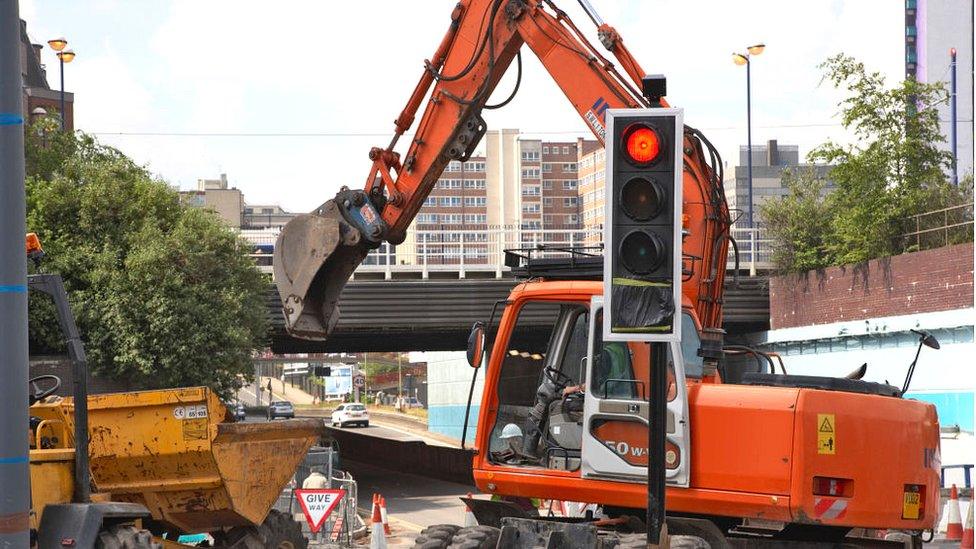
Some local councils are supporting plans for new roads despite declaring a "climate emergency"
More than a third of English councils support policies that could increase carbon emissions despite having declared a "climate emergency", BBC research suggests.
Road building and airport expansion are among examples provided by 45 out of 121 questionnaire respondents who say they have passed climate motions.
Environmentalists say the findings reveal "inconsistencies" in approach.
Local leaders insist they are taking action but need more funding.
Between March and June the BBC surveyed all 149 top tier councils in England, of which 136 responded.
Almost nine in 10 councils (121 out of 136 respondents, 89%) have declared a "climate emergency"
Of those, more than one in three councils (45 out of 121 respondents, 37%) said they supported at least one policy that could increase carbon emissions, such as new road building or airport expansion
About two-thirds of councils (91 out of 136 respondents, 67%) said the pandemic had affected their plans to tackle climate change.
The government has committed to cutting greenhouse gases to almost zero by 2050 - this target is known as net zero.
This means reducing emissions as far as possible, then balancing out any remaining releases by, for example, tree planting. The similar term of carbon neutrality refers to doing this for CO2 emissions rather than all greenhouse gases.
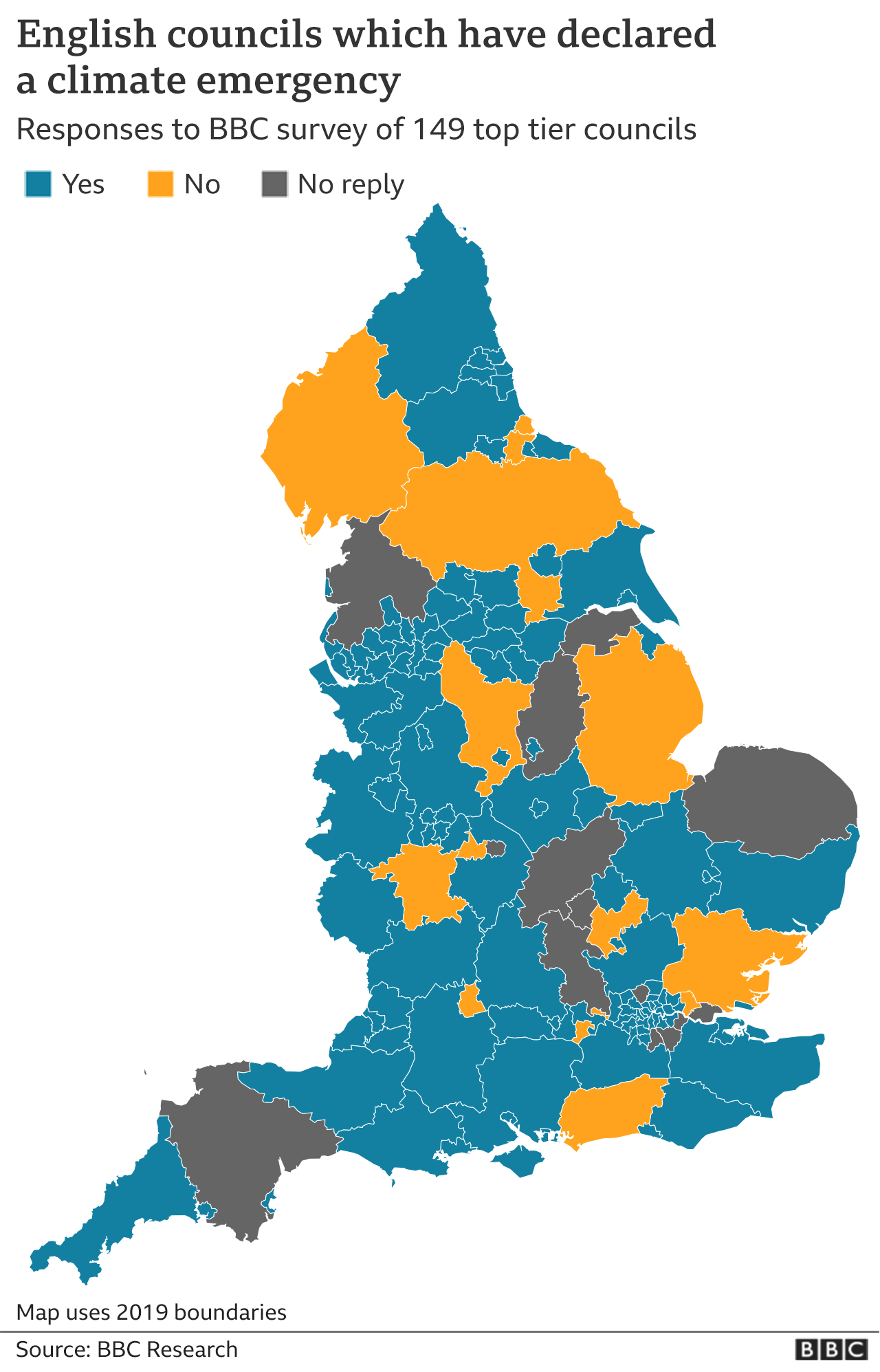
The BBC's findings highlight the tensions faced by councils trying to balance economic, social and environmental challenges.
Leeds, for example, aims to become a carbon neutral city by 2030, but the city council also backs plans to upgrade Leeds Bradford Airport.
Helen Hayden, councillor for infrastructure and climate for Leeds City Council, told BBC News: "It would seem like an inconsistency. I would say that in terms of carbon emissions the airport accounts for 1.5% of our carbon emissions.
"So we do have to keep it in context and not let it distract us from doing all those things that will actually tackle the bigger issues that are in our city.
"We need that National Policy framework so that Leeds Bradford airport does not feel it is being punished as opposed to other airports in the country - and we can therefore work with them to get our green and sustainable future."


Our survey covers England, but you would find similar results in many places round the globe.
Politicians face unenviable tensions. On one hand, there's concern for existing businesses and jobs.
On the other hand, there's the plea from scientists for radical emissions cuts.
It's taken decades for the climate message to be heard among the clamour of voters' demands for housing, transport and education.
Many councils and governments are now on a path towards curbing emissions - many are just moving far too slowly.
Take Leeds. It aspires to be a leading green city, and in many ways it is. But recently, after a marathon debate, its councillors backed an upgrade of the city's airport.
This will increase the emissions the council is committed to eliminate.
Councillors backed it because it will improve the image of the city - and because they feared holidaymakers would use another airport.

Tower Hamlets is committed to achieving net zero carbon by 2025, but has also backed the construction of the Silvertown Tunnel under the Thames.
"East London has suffered from a lack of river crossings and the Silvertown Tunnel will offer the prospect of a solution to the terrible air quality and congestion problems at Blackwall Tunnel," a spokesperson for the council said.
Shropshire Council is supporting efforts to make the county carbon neutral by 2030, while also pursuing the delivery of an £87m North West Relief Road in Shrewsbury.
However, it adds that the ring road would bring environmental benefits through new walking and cycling routes.
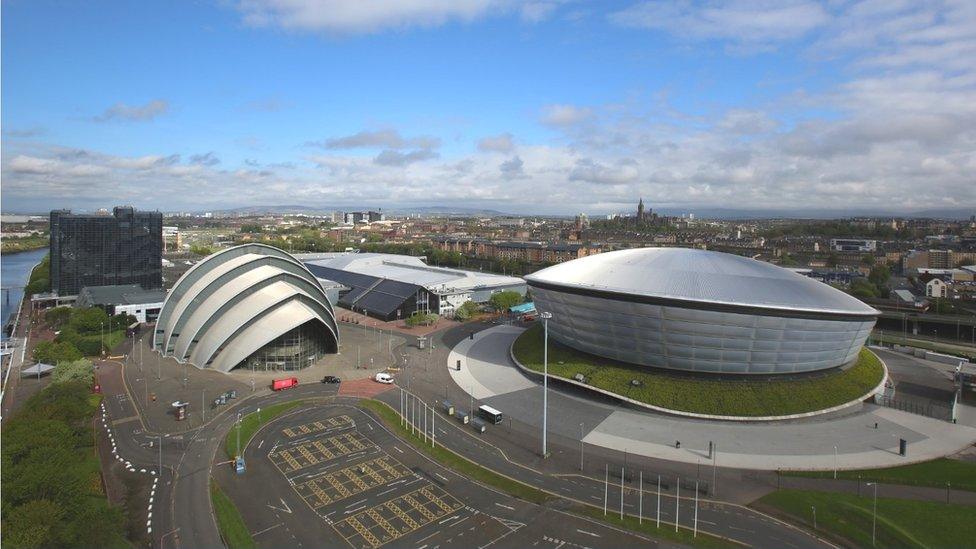
Pressure is growing on the government ahead of the Glasgow climate summit in November
Dr Neil Jennings, partnership development manager at the Grantham Institute for Climate Change at Imperial College London, said many councils have "shown leadership" but there are "apparent inconsistencies" in approach.
"It's hard to see how airport expansion or investment in major new road building are consistent with net zero aspirations," he said.
The National Audit Office said in a recent report, external that government support for councils trying to tackle climate change was inadequate and under-funded.
The environmental campaign group Friends of the Earth is calling for the introduction of a legal duty for councils to take UK climate change targets into account when considering planning applications.
"We won't come close to confronting the climate crisis if coal mines and airport expansions are approved," it said.
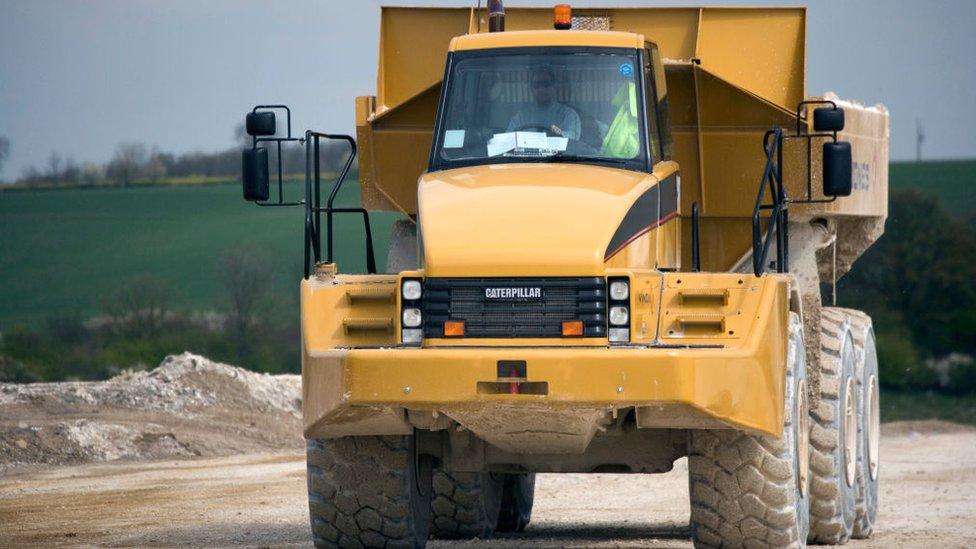
Environmental groups are calling for councils to have a legal duty to consider climate change in planning applications
Alongside their declarations, councils highlighted hundreds of green projects to tackle climate change.
Some of the more innovative ideas include the funding of two deep geothermal power projects in Cornwall, per gram CO2 charges for parking permits in Kensington and Chelsea, turning Newcastle into a "15 minute city" requiring minimal travel, one of the longest living green walls in the UK in Liverpool, and the trialling of electric car hire at a library in Staffordshire.
Councils that had not declared a climate "emergency" insisted they were still committed to tackling climate change.
While some councils reported that the pandemic had had a positive effect on their plans to tackle change, more said the impact had been negative.
In Dorset, the drop in road traffic brought about an estimated 27% reduction in carbon emissions, according to the council.
"This shows us as a society what is possible in a short time when 'business as usual' is adjusted. We must not lose some of these gains and rush back to how things were before the pandemic," it added.
However, St Helen's Council said the pandemic had had a "major impact" on council resources.
"The commitments remain the same but progressing actions in respect of climate change have stalled," it added.
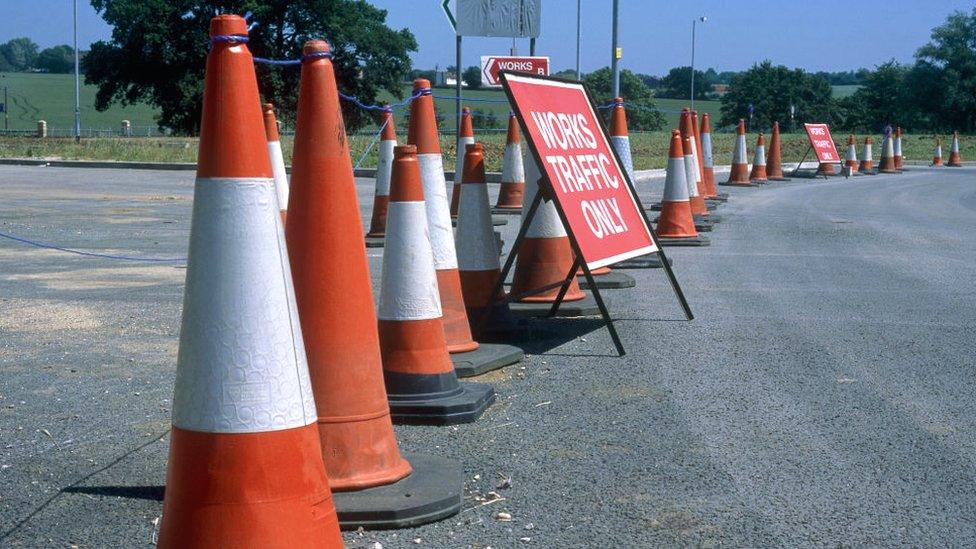
Councils say they need more funding to plan for decarbonisation
The Isle of Wight Council said the Covid-19 response had delayed the delivery of its climate strategy, meaning the original aim of achieving net zero carbon emissions on the island by 2030 is likely to be "pushed back" to 2040.
Cllr David Renard from the Local Government Association said: "Net zero can only be achieved if decarbonisation happens in every place, community and household. Long-term funding for councils would mean they can properly plan ahead on the needs of their local communities as a whole to support this."
A government spokesperson said councils had already been provided with billions in funding.
Additional reporting: Rob England & Anna-Marie March
If you want to find out more, BBC Radio 5 Live's series Leeds: City On A Mission is focusing on the community for a year as residents, businesses and public authorities try to reach net-zero by 2030. You can follow the story online or on 5 Live.
